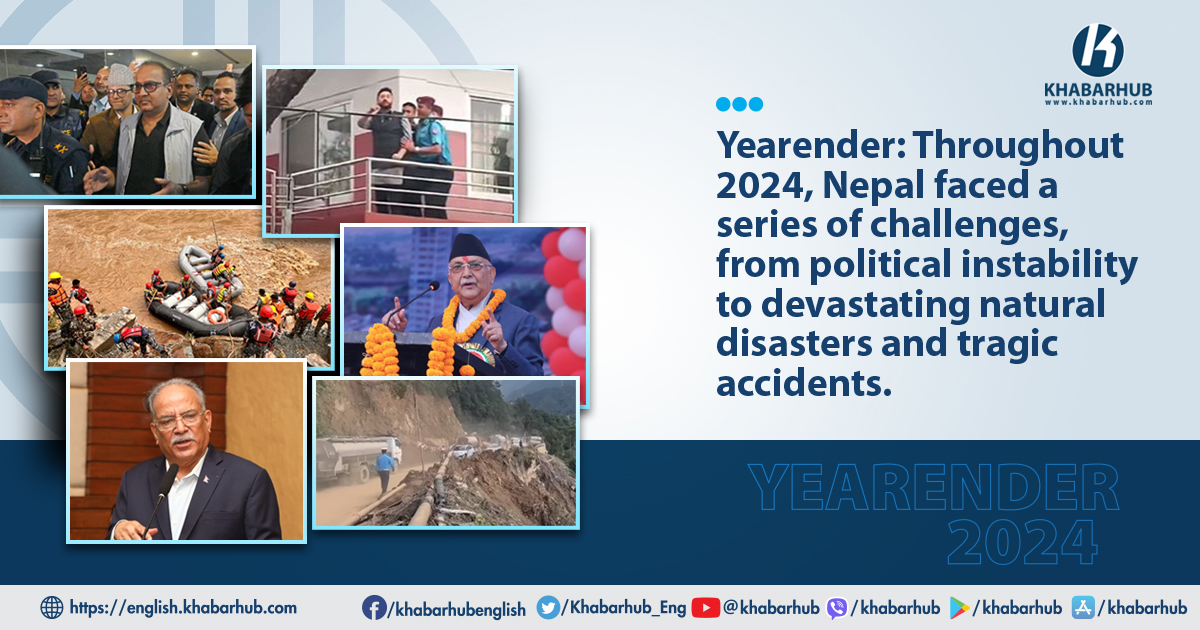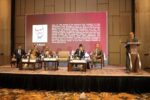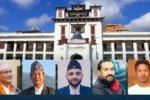KATHMANDU: The year 2024 in Nepal was marked by significant political developments, tragic incidents, and notable achievements that defined the country’s landscape.
The year began with a somber note on 5 January when Nepal suspended the issuance of work permits for its citizens to Russia and Ukraine after the tragic deaths of 10 Nepali nationals who were serving in the Russian Army.
This decision highlighted the increasing concerns regarding the safety of Nepali migrant workers abroad.
In March, a key political shift occurred when Prime Minister Pushpa Kamal Dahal ended his coalition agreement with the Nepali Congress, the largest opposition party, and formed a new government.
This new coalition involved the Communist Party of Nepal (Unified Marxist-Leninist), as well as other smaller political factions. This move was part of an ongoing realignment within Nepal’s complex political landscape, underscoring the fluid nature of coalition politics in the country.
The political landscape was again thrust into the spotlight in May when the Supreme Court of Nepal issued a landmark order to the government, restricting the number of permits issued to climbers seeking to scale Mount Everest and other peaks.
From 27 September to 1 October, heavy rainfall triggered widespread flooding and landslides across the country, claiming at least 224 lives and leaving 24 missing.
This ruling was in response to concerns about overcrowding and the environmental impact of mass tourism in the country’s mountain ranges.
Meanwhile, 21 May saw the arrest of Kailash Sirohiya, the owner of Nepal’s largest news organization, Kantipur Publications, after his citizenship card was found to share the same number as another person.
This case stirred debate over citizenship laws and raised concerns about their enforcement.
June proved to be a particularly challenging month for Nepal, with natural disasters wreaking havoc across the country.
On 26 June, heavy rains swept through several regions, killing at least 20 people.
Three days later, on 29 June, landslides claimed the lives of nine more individuals. These events, which were part of a broader trend of extreme weather patterns, underscored the vulnerability of the country’s infrastructure to natural calamities.
In July, Nepal’s legal and political systems were tested once again.
On 1 July, religious figure Ram Bahadur Bomjon was sentenced to ten years in prison for the sexual assault of a minor. Bomjon had previously garnered attention for his self-proclaimed spiritual powers, making his conviction a significant event in Nepal’s religious and legal circles.
At the same time, political instability continued to grip the nation as the CPN-UML withdrew from Prime Minister Dahal’s coalition, further complicating governance.
On 12 July, two buses were swept off the Narayangarh-Mugling highway by a landslide, killing at least 11 people and leaving 51 others missing, prompting a massive rescue operation.
This disaster was a grim reminder of the country’s susceptibility to landslides, especially during the monsoon season.
Following the no-confidence motion against Dahal, the political arena witnessed another shift on 14 July, when KP Oli, leader of the CPN-UML, was named the new Prime Minister.
He formed a coalition with the Nepali Congress, and was formally inaugurated the following day.
However, the political chaos continued as 24 July brought a tragedy at Tribhuvan International Airport when a Saurya Airlines Bombardier CRJ200 crashed during takeoff, killing 18 out of 19 people aboard.
This crash was a reminder of the safety challenges in Nepal’s aviation sector, known for its difficult terrain and weather conditions.
August was also marred by tragedy. On 7 August, a helicopter belonging to Air Dynasty, en route from Kathmandu to Syaprubeshi, crashed in the forested mountains of Nuwakot, killing all five people aboard, including four Chinese nationals.
A few days later, on 16 August, a glacial lake outburst flood inundated the village of Thame in Solukhumbu District, destroying at least 15 structures and highlighting the growing concerns about climate change in the region.
Meanwhile, the government made headlines on 22 August when it lifted the ban on TikTok that had been imposed in November 2023, a move that sparked both relief and controversy.
The monsoon season continued its deadly toll in August, with 23 August witnessing another tragedy when a bus carrying Indian pilgrims veered off the Prithvi Highway and plunged into the Marshyangdi River, killing 27 people and injuring 16.
Despite these setbacks, 30 August was a bright moment in Nepalese sports as Palesha Goverdhan became the first Nepali athlete to win a medal at the Summer Paralympics in Paris.
The political and legal turmoil continued into October, with former Deputy Prime Minister Rabi Lamichhane arrested on 18 October for suspicion of fraud and organized crime involving embezzlement from a financial cooperative.
Goverdhan’s bronze in para taekwondo marked a historic achievement for the country in the realm of international sports.
As the year progressed, Nepal faced even more devastating natural disasters.
From 27 September to 1 October, heavy rainfall triggered widespread flooding and landslides across the country, claiming at least 224 lives and leaving 24 missing.
The tragedy was one of the deadliest in recent years, causing immense destruction and highlighting the urgent need for better disaster preparedness and response systems.
In October, Nepal’s mountaineering community was shaken once again when 8 October saw the discovery of five Russian climbers’ bodies on Dhaulagiri.
The climbers had been missing since the 6th, and their deaths served as a grim reminder of the dangers inherent in high-altitude expeditions.
The country also celebrated a significant human rights achievement on 9 October when activist Deepti Gurung was awarded the prestigious Nansen Refugee Award by the United Nations High Commissioner for Refugees.
Gurung was recognized for her tireless efforts to amend Nepal’s citizenship laws, which had left many people stateless, including her own daughters. Her award brought international attention to the challenges facing marginalized communities in Nepal.
The year served as a reminder of the complex and multifaceted nature of life in Nepal, where progress and tragedy often coexist, shaping the national consciousness and future trajectory.
The political and legal turmoil continued into October, with former Deputy Prime Minister Rabi Lamichhane arrested on 18 October for suspicion of fraud and organized crime involving embezzlement from a financial cooperative.
Lamichhane’s arrest was seen as part of the ongoing scrutiny of corruption in Nepal’s political elite.
Additionally, November closed the year with another tragic accident when a van fell off a mountain road near Shaileshikar on 15 November, killing eight people and injuring four others.
This accident underscored the persistent risks of road travel in Nepal’s mountainous regions, which are often prone to accidents due to poor infrastructure and hazardous weather conditions.
Additionally, the inaugural Nepal Premier League (NPL) 2024, held from November 30 to December 21 in Kathmandu, featured eight teams competing in a Twenty20 format.
The Janakpur Bolts emerged as champions, defeating the Sudurpaschim Royals in the final. Lahiru Milantha of the Janakpur Bolts was the tournament’s top scorer with 293 runs, while Scott Kuggeleijn (Sudurpaschim Royals) and Lalit Rajbanshi (Janakpur Bolts) led in wickets, each taking 17. Saif Zaib of the Sudurpaschim Royals was named Player of the Series.
Throughout 2024, Nepal faced a series of challenges, from political instability to devastating natural disasters and tragic accidents.
However, it was also a year of remarkable resilience, with achievements in sports and human rights, highlighting the nation’s enduring spirit in the face of adversity.
The year served as a reminder of the complex and multifaceted nature of life in Nepal, where progress and tragedy often coexist, shaping the national consciousness and future trajectory.









Comment